COVID-19 has laid bare the devastating cost of inequality in the U.S. More than 600,000 people have died from the virus. Black and Hispanic people are at least twice as likely as white Americans to die of COVID-19, according to data from the Centers for Disease Control and Prevention.
“The pandemic was a crisis nationwide, but it didn’t hit everyone equally,” said Megan Curran, director of policy at Columbia University’s Center on Poverty and Social Policy. “Some people suffered a lot more than others.”
Congress authorized nearly $6 trillion in federal spending, tax cuts, loans, grants and subsidies after COVID-19 restrictions sent the economy into a tailspin. From March to April 2020, the U.S. economy shed more than 20 million jobs, according to the Bureau of Labor Statistics.
Although this aid forestalled an overall rise in poverty, families at opposite ends of America’s racial and class divide experienced widely different outcomes.
Owing to an uneven distribution of benefits, some of those hit hardest by COVID-19 did not receive federal aid — and even for those that did get assistance, it wasn’t always enough.
When new COVID-19 cases peaked in early January, low-wage workers and people of color were more likely to report hardship, according to a News21 analysis of the U.S. Census Bureau’s Household Pulse Survey.
Jenise Jenkins, 40, and Donald Jenkins, 53, were among the millions of people who found themselves out of work during the pandemic.
Donald Jenkins was let go in April 2020 from his job detailing cars in Houston, Texas. The couple got by on unemployment benefits and Jenise Jenkins’ salary.
Unemployment insurance, economic impact payments, rental assistance and eviction moratoriums kept millions of families from going hungry or becoming homeless, even as unemployment reached 14.7%, the highest level since the Great Depression.
“People that lost work … might have received a combination of both the stimulus checks and maybe some of the enhanced unemployment benefits,” Curran said. “That was kind of replacing, hopefully, some of the income that they were losing.”
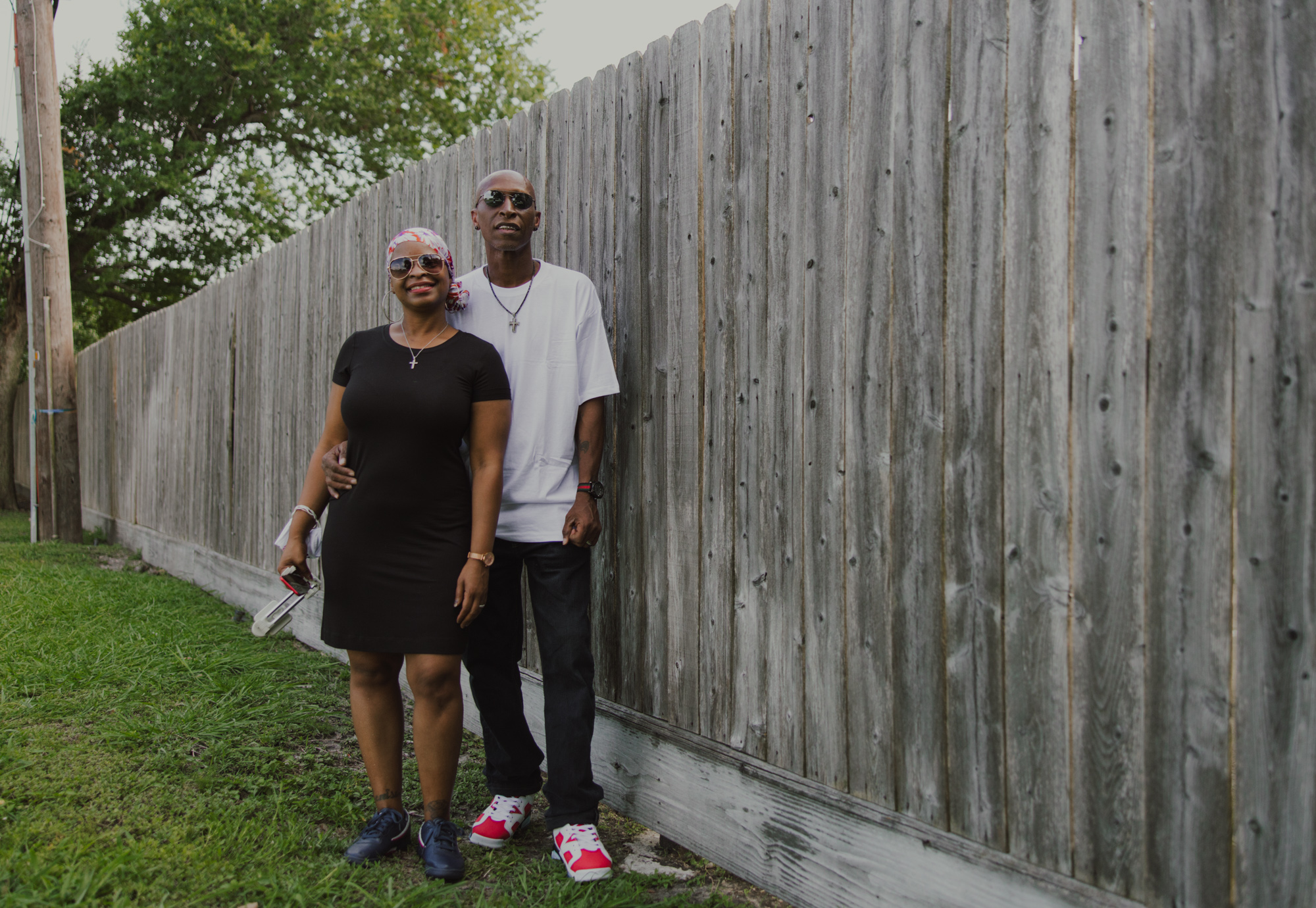
Jenise Jenkins with her husband Donald Jenkins pose near their apartment in Houston, Texas. Before they received help from West Houston Assistance Ministries, they were at risk of being evicted. (Jimmy Cloutier/News21)
But for the Jenkinses, it wasn’t enough. In November, Jenise was diagnosed with stage three breast cancer.
She resigned from her job to take care of her health shortly after. Denied Medicaid, they pay a monthly insurance premium of $605. This, on top of the couple’s normal bills, was more than they could manage without steady income.
“Not only did we have to worry about rent, food, but most importantly, my survival and me being here on this Earth,” said Jenise Jenkins.
On weekends, her husband rode buses to his hometown of New Orleans to cut hair, mow lawns and work other odd jobs. He sent money home through Cash App.
The couple’s financial burden and Jenise Jenkins’ cancer diagnosis, along with the sudden death of her mother-in-law in September, took a toll on her mental health. She often walked along a trail near their apartment to clear her head.
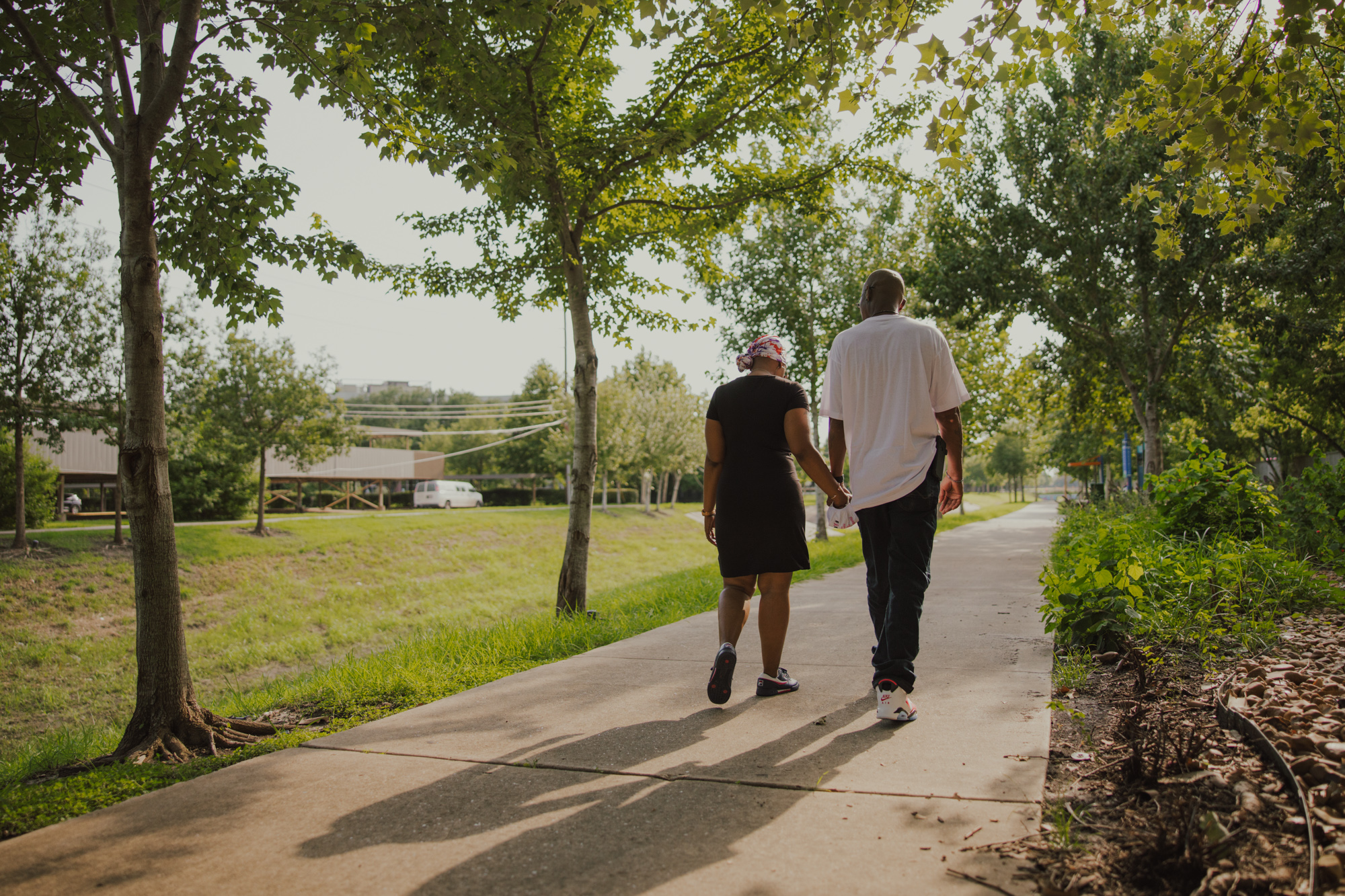
Jenise and Donald Jenkins walk on a trail near their home in Houston, Texas. Jenise has battled depression throughout her cancer treatment and would walk this path to clear her head. (Jimmy Cloutier/News21)
“I would walk the trail, but I would be crying,” she said. “Then on my way back … I’ll feel a little relief because I had time to think, time to kind of just get out, get some fresh air.”
She struggled with depression before COVID-19, but the couple’s tumultuous life during the pandemic pushed her to a breaking point. Donald Jenkins stopped traveling to New Orleans so he could spend more time with her.
“Dealing with mental illness and dealing with other things, I needed him as my supporter, as my caregiver,” she said.
Eventually they turned to West Houston Assistance Ministries, a nonprofit organization, after they fell behind on rent. WHAM paid for three months of the Jenkinses’ rent.
“The scary part was we’ve seen a lot of people that were getting evicted,” Jenise Jenkins said. “We see a lot of people with notices on their door from the constable and from the court. So I’m like, OK, we may be next.”
In Harris County, Texas, where the Jenkinses have lived together for 12 years, more than 46,000 eviction cases were filed in the first six months of 2021, according to January Advisors, a data science consulting firm.
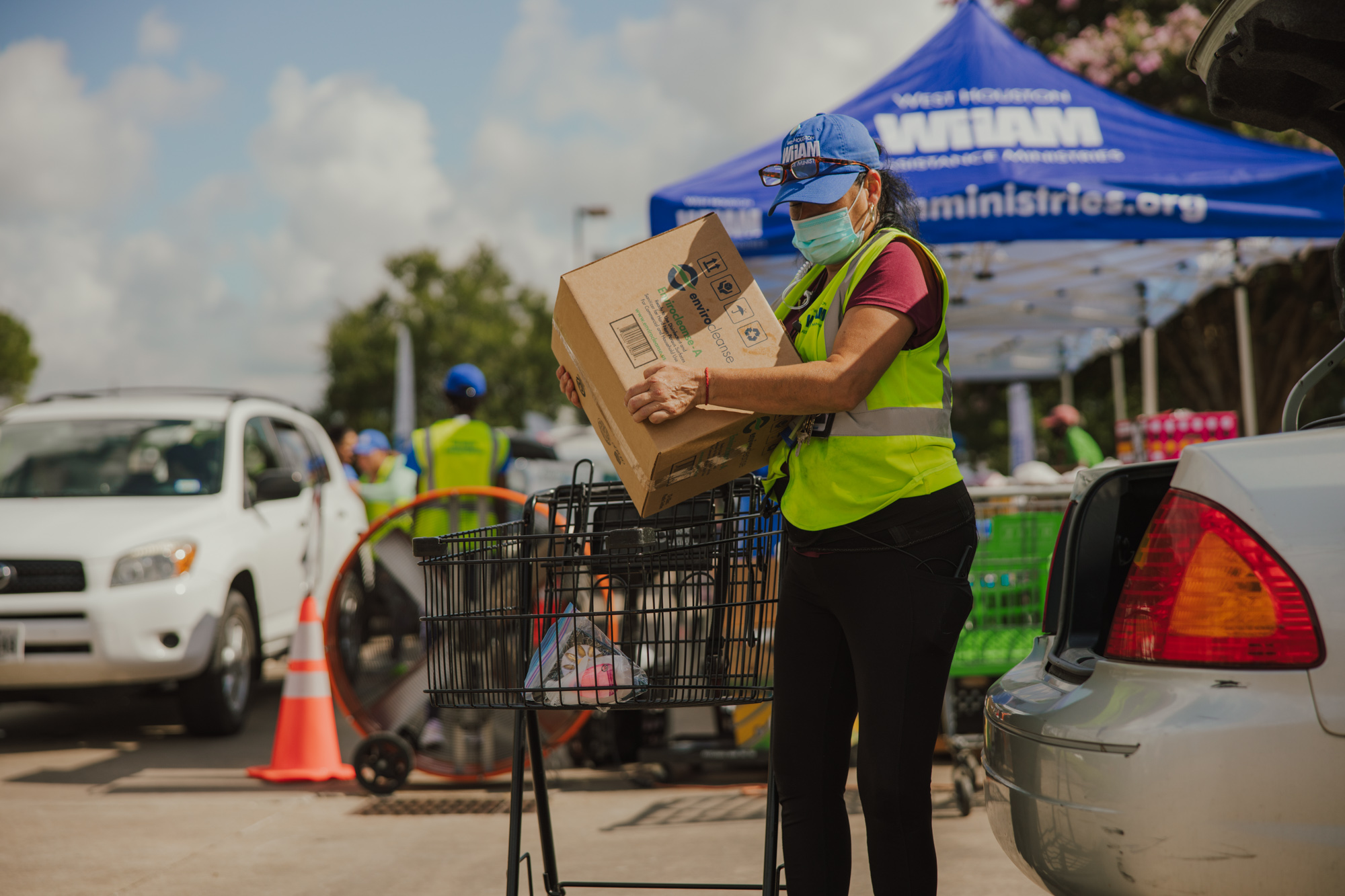
A volunteer places food in a car in the food distribution line at West Houston Assistance Ministries in Houston, Texas. Since March 16, 2020, WHAM has served more than 180,000 people with food assistance — a dramatic increase from their usual 35,000 per year. (Jimmy Cloutier/News21)
The Eviction Lab has collected data from six states and 31 cities showing that almost 450,000 evictions were filed during the pandemic, in spite of federal, state and local moratoriums.
Although the Jenkinses are no strangers to hardship — they left New Orleans after the devastation of Hurricane Katrina in 2005 — Jenise Jenkins was reluctant to ask for financial assistance.
“When it was my time to ask for money for my chemotherapy … the pride kicked in,” she said. “It’s embarrassing to ask for money.”
COVID-19 forced many families to seek financial help for the first time. Brian Carr, the chief advancement officer at Northwest Assistance Ministries, another nonprofit in Harris County, Texas, said NAM has seen a large increase in those new to seeking services.
“We estimate that the increase in both the food pantry and rent mortgage assistance — that about 40% of those people are first-time applicants for social services. They’ve never had to apply for aid before or food stamps or … rent assistance,” he said. “While they were right there on that edge of the poverty line, the shutdown … took their feet out from under them.”
Yenifer is a 24-year-old immigrant from Santa Bárbara, Honduras, living with her partner, Yovani, and her two sons in Santa Fe, New Mexico. Yenifer, who asked that their last names not be used, said she and Yovani were among the first in Santa Fe to be diagnosed with COVID-19. Her boys, 8-year-old Eydan and 3-year-old Gael, caught it two months after them.
“I didn’t understand the seriousness of what was happening,” Yenifer said in Spanish. “At that time I didn’t understand what the disease really was, and for me, the last year was the worst.”
With almost one-fifth of its population of 2.1 million living below the poverty line in 2020, New Mexico is the third-poorest state in the U.S.
Overall, New Mexico fared well with COVID-19 cases and deaths during the first several months of the pandemic, avoiding a summer spike in new cases — unlike neighboring Arizona and Texas.
But Hispanic residents, who account for nearly half of Albuquerque and Santa Fe’s populations, were disproportionately affected. They are about twice as likely to contract COVID-19 and almost three times as likely to be hospitalized as white, non-Hispanic residents, according to the CDC.
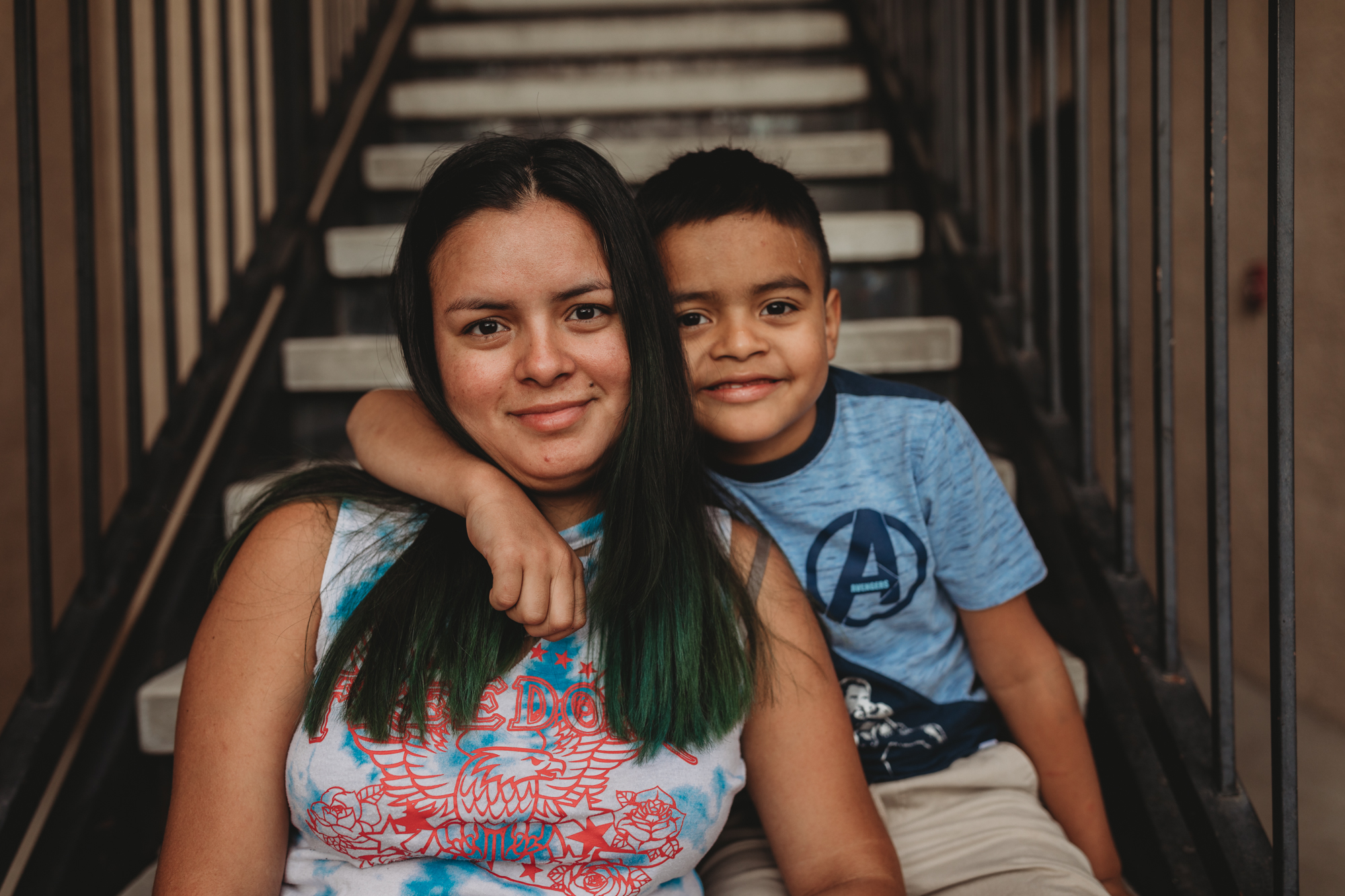
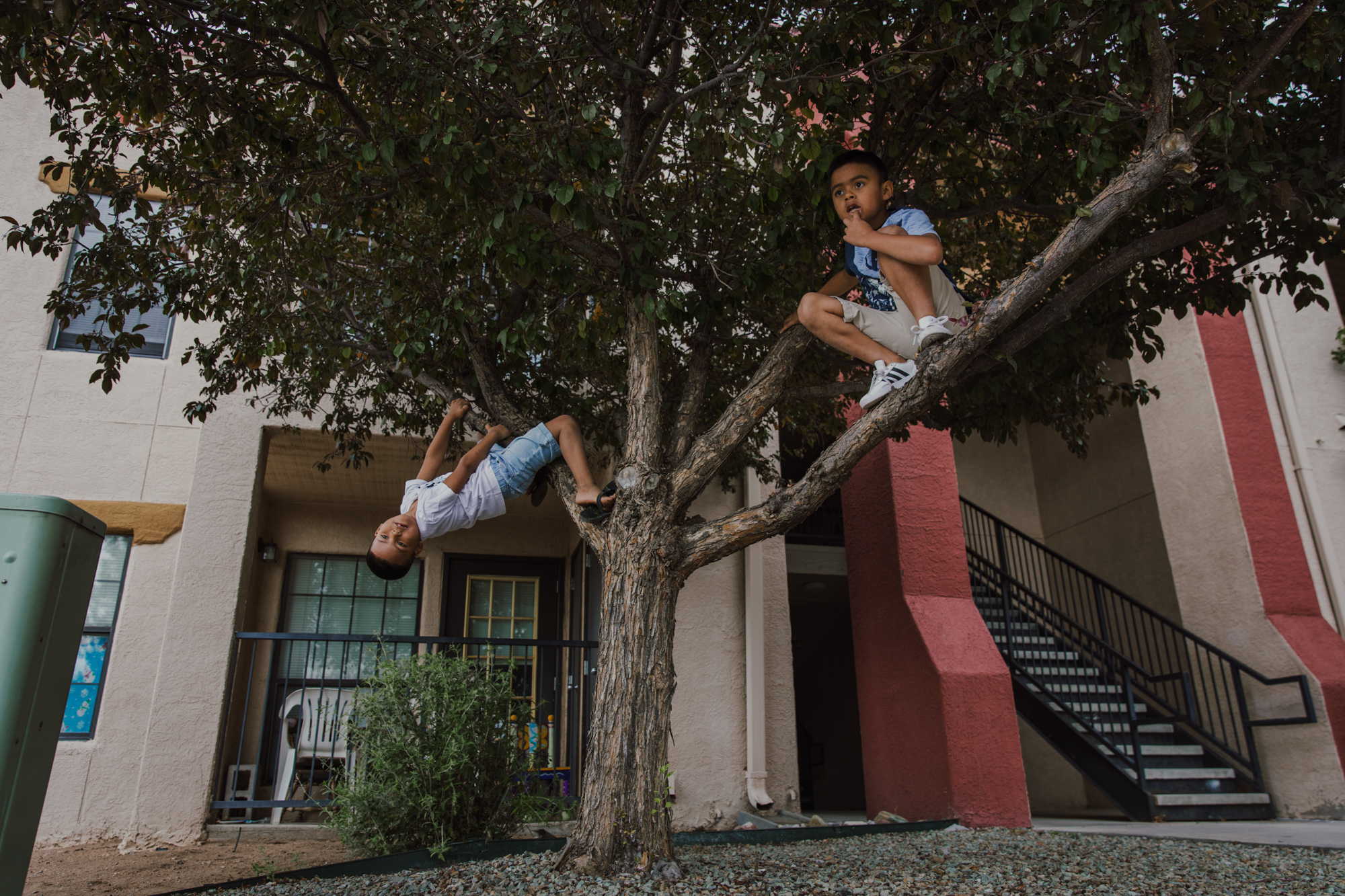
Left: Yenifer with her son Eydan outside their home in Santa Fe, New Mexico. Yenifer was among one of the first people in New Mexico to get COVID. (Jessica Ruiz/News21) Right: Yenifer’s son, Eydan, left and her nephew, Eduardo, right, climb and swing on a tree outside of Yenifer’s apartment in Santa Fe, New Mexico (Maxwell Shavers/News21)
In between COVID-19 diagnoses, the family took test after test at various hospitals. All came back negative, but the confusion and fear Yenifer felt only increased as more of her extended family in Texas became ill, her sister severely. As a result, Yenifer fell into a deep depression.
“My depression got really bad, because you couldn’t go out. When you went to the store … you couldn’t find water,” she said. “It hit me — and my family in Honduras. My grandmother had no food … she told me (she) was eating a tortilla with coffee.”
With the family in quarantine at different times, Yovani, the only provider, couldn’t work his job at a local bakery. Yenifer said his boss was generous enough to temporarily pay normal wages as if Yovani were still working. However, they still struggled financially and “battled and battled for two or three months.”
The couple paid their rent first, even if that meant they had no money for food.
“One day my son said, ‘Mommy, I want an apple.’ I didn’t have one,” Yenifer said, wiping away tears. “I am in a country with everything and didn’t have an apple.”
At that moment, she realized she needed help, not only for her family, but for herself. She accepted food assistance from Las Cumbres, a community services organization, and mental health support from Gerard’s House, a grief center for children and families.
Volunteers package non-perishable food items at Roadrunner Food Bank in Albuquerque, New Mexico. (Maxwell Shavers/News21)
Nationally, food insecurity has risen with the pandemic. From 2019 to 2021, Feeding America projects an increase of nearly 7 million more Americans experiencing food insecurity.
Black and Hispanic people were more than twice as likely as white people to say that they did not have enough food from June 23 to July 5, according to the most recent Household Pulse Survey.
“Food insecurity is associated … with a 253% higher risk of depression,” according to a study by BMC Public Health, a peer-reviewed journal, on the connection between food insecurity and the mental health of low-income Americans during the pandemic.
“Being food insecure is associated with higher risk of mental health (issues), both depression and anxiety,” said Di Fang, primary author of the study and associate professor at the University of Arkansas. This risk is almost three-fold compared to losing a job during the pandemic, she added.
The negative effects of COVID-19 on food insecurity, unemployment, health care and evictions are closely linked to deteriorating mental health on a broader scale.
“The pandemic is not just a … public health crisis,” said Fang. “It’s also a food crisis in terms of hunger. It’s also a mental health crisis.”
Despite the government’s unprecedented response to COVID-19, some people faced obstacles that slowed the distribution of financial assistance or blocked it entirely. Because economic impact payments were tied to household tax returns, people who didn’t file tax returns — a group that typically includes the poorest families — did not automatically receive stimulus checks.
Others experiencing long-term unemployment, including those who lost their jobs several months before the pandemic, may not have qualified for expanded unemployment insurance.
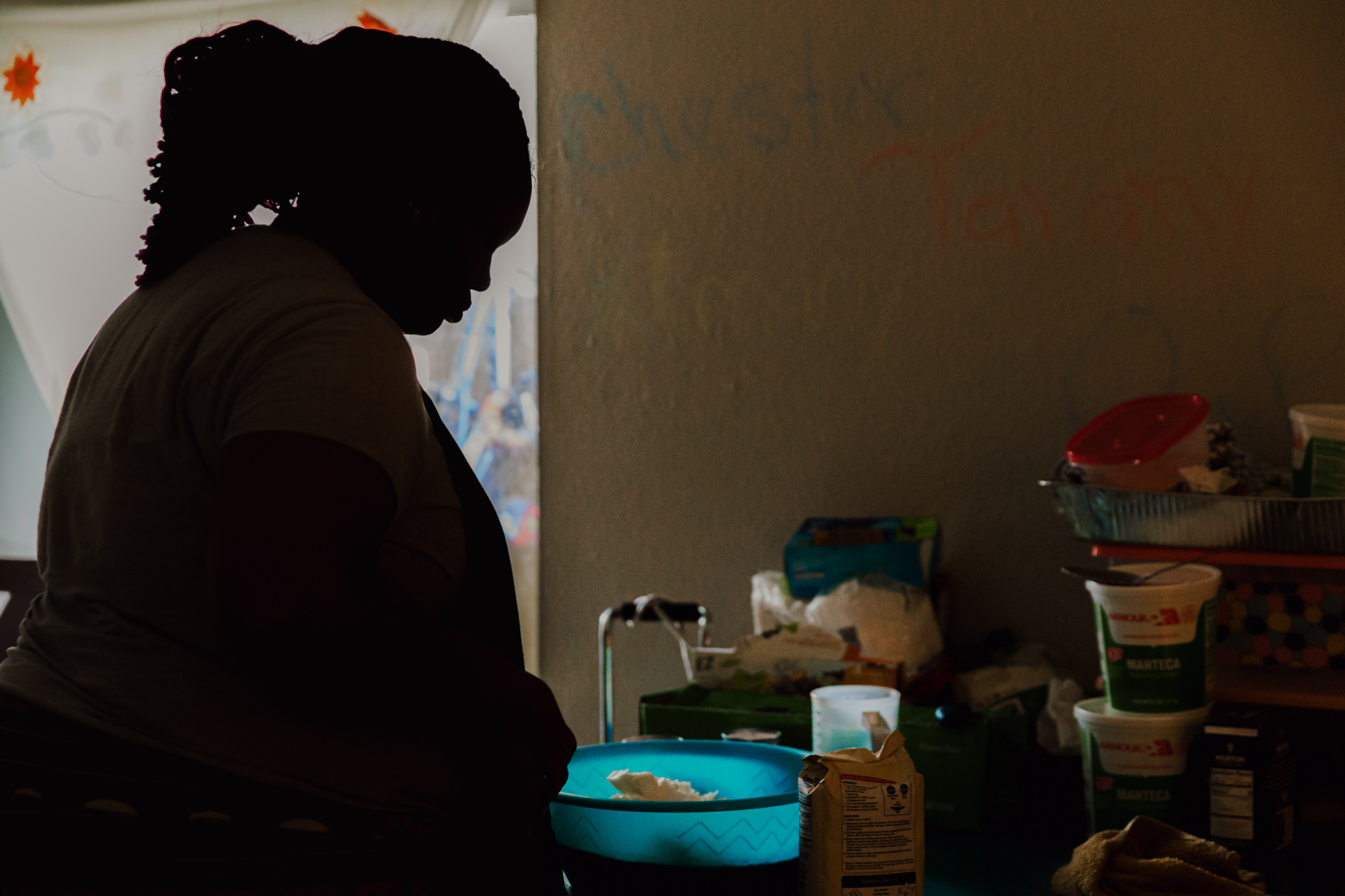
Janeth Ramos makes Honduran pan de coco and rollos de canela in her apartment in Houston, Texas. (Ramos asked that her face not be shown.) (Maya Leachman/News21)
For 26-year-old Janeth Ramos, in Houston, Texas, her immigration status was a barrier. She and her three children came to the U.S. around two years ago, fleeing gang violence in Honduras.
Until recently, she worked for a disaster recovery service that took her out of state. The children stayed with a sitter. Then, in early 2021, her hours were reduced — Ramos said there wasn’t enough work to go around — and what she took home in earnings no longer covered travel costs and child care.
Unauthorized to work in the U.S., Ramos said she struggled not only to find new employment but also to secure assistance for her family. Although undocumented immigrants were among the hardest hit by COVID-19, they did not qualify for economic support, including expanded unemployment insurance, food assistance and stimulus checks.
“Undocumented people … have been consistently left out of a lot of policy, even though they are more likely to experience financial pain,” said Areeba Haider, a research associate for the Poverty to Prosperity Program at the Center for American Progress.
Unlike U.S. citizens and legal residents, undocumented immigrants have no safety net, which makes them especially vulnerable to financial instability, added Haider.
With her 9-year-old daughter, Ramos made Honduran pan de coco, rollos de canela and tamarind Popsicles, which she sold around the block to make some money.
“I just need to work … to pay my bills, to have something to give my kids,” said Ramos. “I cannot be in the street with my kids.”
As she waited for the rolls to rise, Ramos sat with her children on the couch, her youngest son on her lap, his hands in her own. Without additional help, she knows they may end up homeless, or they may have to go back to living in a shelter — an experience the children know all too well.
“They don’t like that situation, because they feel sad,” she said. “They cry with me.”
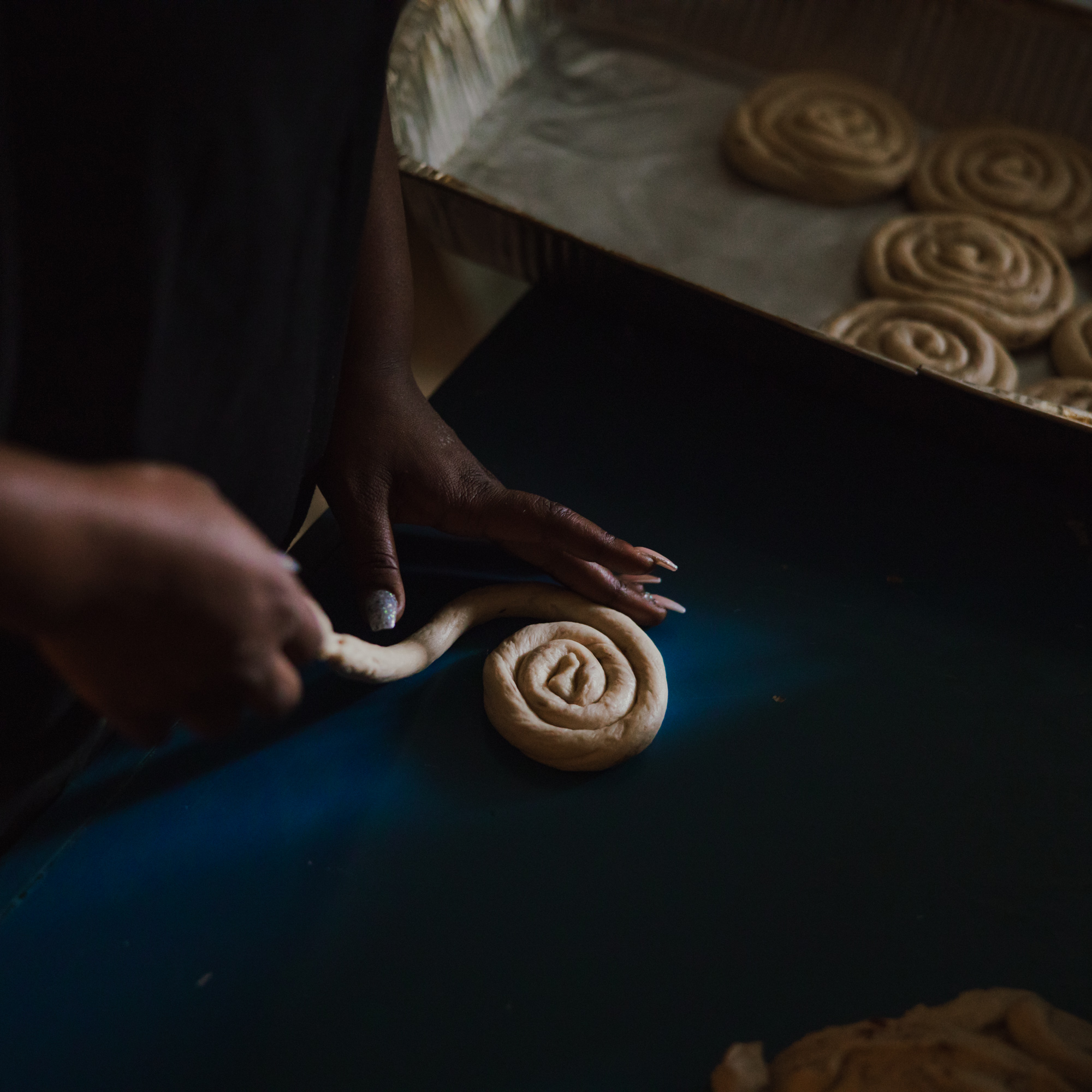
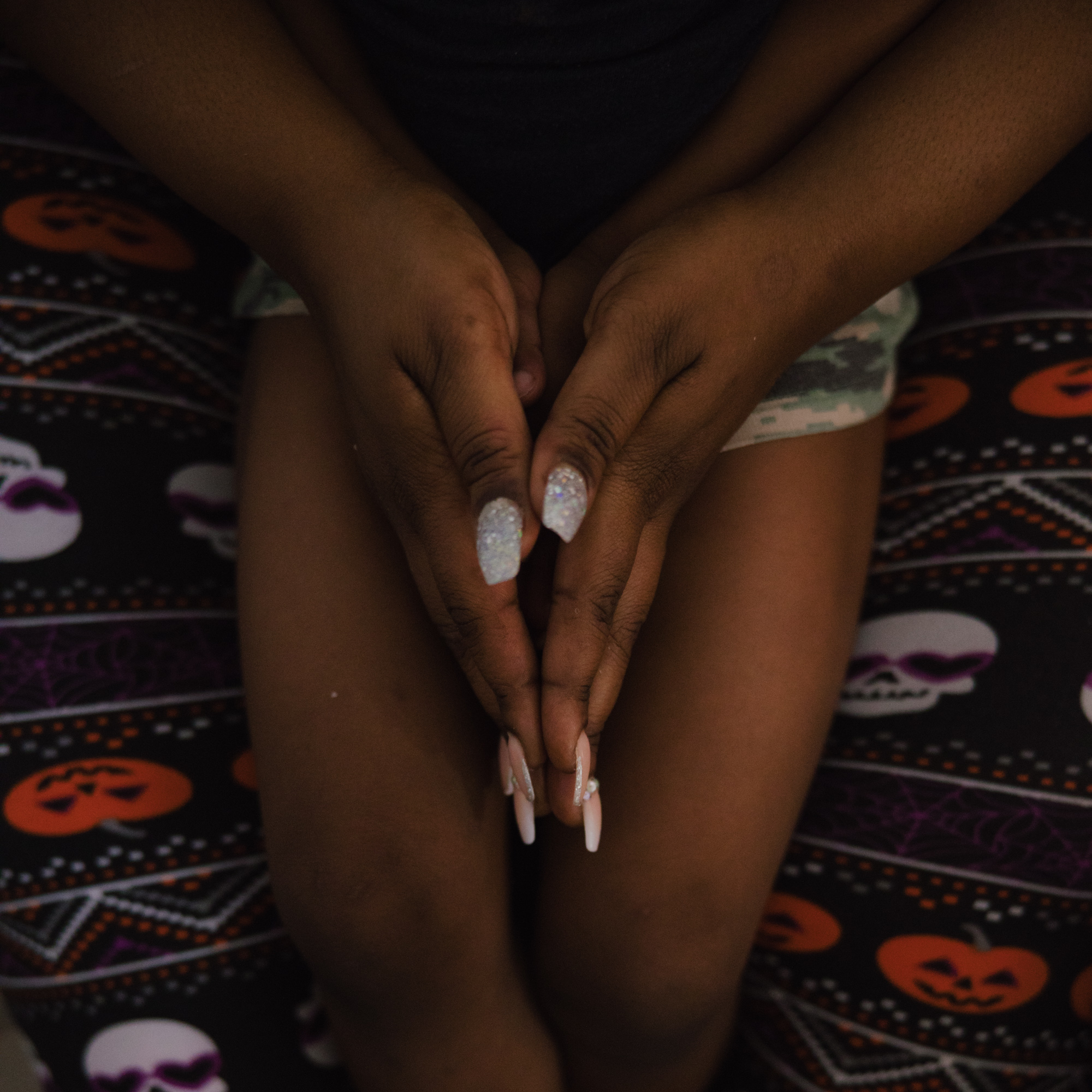
Left: Detail of Janeth Ramos preparing the rollos de canela in her home in Houston, Texas. Once the rolls are finished baking, she puts them in a shopping cart and sells them around her neighborhood. Right: Janeth Ramos holds her 3-year-old son in their home in Houston, Texas. Ramos and her three children came to the U.S. about two years ago, fleeing violence in Honduras. (Jimmy Cloutier/News21)
Even mixed-status families, where at least one family member has legal residency, were largely excluded from receiving pandemic relief. Under the Trump administration, undocumented immigrants were barred from collecting the first and second stimulus checks, even if their children were American citizens.
As a result, at least 2.2 million American and legal immigrant children were excluded from receiving stimulus checks, according to the Migration Policy Institute.
Heidy Gonzalez’s children were among those denied federal assistance on the basis of their parents’ immigration status. Gonzalez, who left El Salvador nearly two decades ago, lives in Sacramento, California, with her husband and five kids. She asked that their names not be used. Her three youngest were born in the U.S.
In mid-March 2020, Gonzalez, a housekeeper, abruptly lost her job. Worried about COVID-19, the families she worked for let her go. On March 19, 2020, Gov. Gavin Newsom of California ordered a statewide stay-at-home order, the first in the nation. Soon after, Gonzalez’s husband, a truck driver, was laid off.
Because he is authorized to work in the U.S., Gonzalez’s husband was able to collect unemployment insurance for a few months. But Gonzalez said the family received no other assistance from the federal government.
“In this country, you don’t receive the same benefits nor protections as someone who has documents,” Gonzalez said in Spanish.
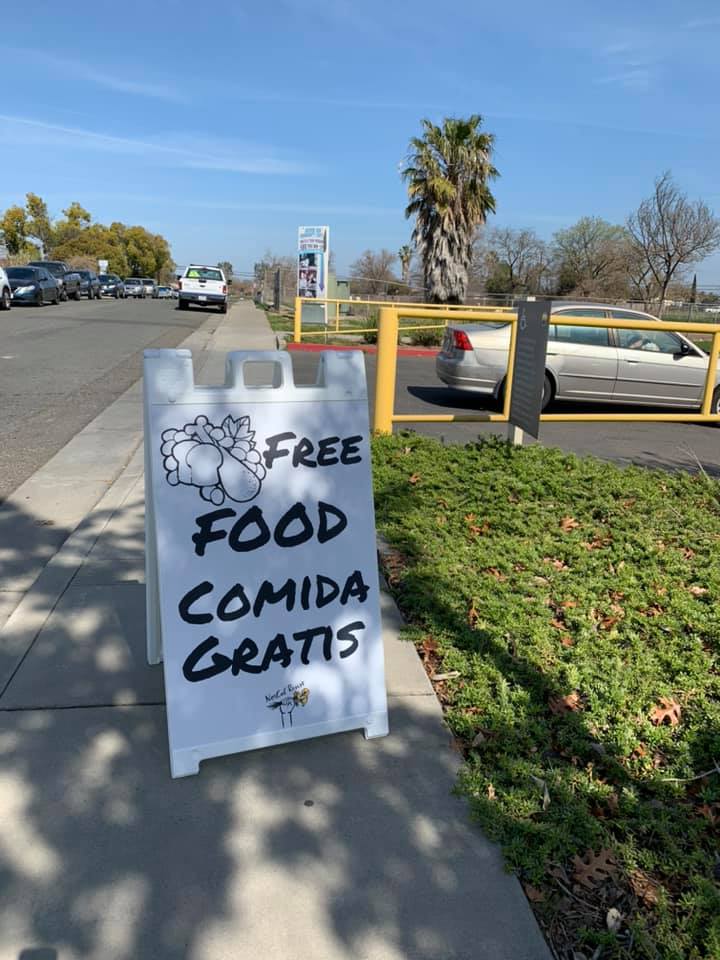
NorCal Resist provides aid and advocacy for immigrants in Northern California. (Photo courtesy of NorCal Resist)
Across the country, nongovernmental social services organizations stepped up, tapping into private donations to extend assistance to families unable to meet the government’s eligibility requirements.
In Northern California, Gonzalez turned to NorCal Resist, a group that advocates for, and provides assistance to, immigrants in the area. The volunteer-run organization gave the family food, masks and hand sanitizer. It also helped Gonzalez file paperwork that would protect her family from eviction during the pandemic.
Autumn Gonzalez, an attorney and volunteer at NorCal Resist, said the organization has provided $960,000 in aid to people in need.
But this assistance cannot make up for families going months without government assistance, said Autumn Gonzalez.
“I think it’s going to take years before the families get back to the place they were pre-pandemic as far as economic stability.”
Millions of people still can’t make ends meet, belying reports of a speedy economic recovery. In the latest Household Pulse Survey, from June 23 to July 5, more than a quarter of households said they had difficulty covering usual expenses, including food, utilities, rent and mortgage payments.
In the same survey, nearly 1% of adults, representing 1.7 million people, said they weren’t working because they had contracted COVID-19 or were caring for someone who was affected by it.
New COVID-19 cases are rising again, driven by the highly contagious delta variant and low vaccination rates in pockets of the country. Only 60% of U.S. adults are fully vaccinated, according to the CDC.
Along with this uncertainty, benefits and protections are ending, depriving low-income households of a critical lifeline. Millions of people have returned to work, though unemployment remains above pre-pandemic levels.
“(Benefits) all have expiration dates, and there is no guarantee that after that arbitrary date passes, people will be in a better place,” said Haider.
Too many people were living below the poverty line and experiencing economic insecurity before the pandemic, said Curran, from Columbia University. “The crisis right now really kind of shone a spotlight on the fact that this was happening beforehand.”
Policy experts and advocates said the pandemic caused a shift in the government’s approach to tackling poverty beyond the current crisis. If passed, the Biden administration’s proposed $1.8 trillion economic plan could reduce poverty by 23% according to the Center on Poverty and Social Policy. The bill would continue several pandemic-era benefits, including an extension to the child tax credit.
While the pandemic has amplified existing inequalities in the U.S., it has also shown how resilient people can be.
Jenise Jenkins is still battling cancer, but after WHAM helped her husband land a new job, the couple has more room to breathe, and they have started on the path to financial recovery.
Yenifer is still working through her depression, and the rise in vaccinations gives her hope. Her partner, Yovani, has returned to work at the bakery.
Heidy Gonzalez said she’s developed tough skin, and while she still worries, COVID-19 “doesn’t impact (her) as much as in the beginning.”
And though Ramos is in a tough spot, she is still resilient. “I believe a lot … in God,” she said. “That’s why I’m strong.”
News21 reporter Maxwell Shavers contributed to this report.